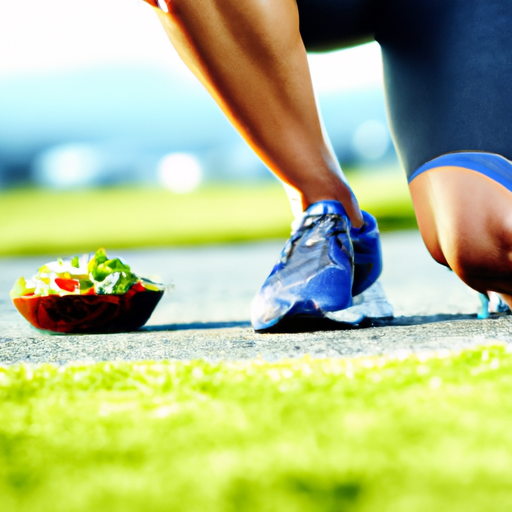You’ve probably asked yourself this question countless times: should I eat before or after I work out? The timing of meals in relation to exercise is a topic that has been debated among fitness enthusiasts for years. Some argue that it’s best to fuel your body with a pre-workout meal, while others believe that waiting until after your workout is more beneficial. In this article, we’ll explore the pros and cons of both options and provide you with the information you need to make an informed decision. So, whether you’re a seasoned athlete or just starting your fitness journey, keep reading to discover the best approach for your workout routine.

Benefits of eating before a workout
Provides energy for the workout
Eating before a workout is essential as it provides your body with the necessary energy to perform at its best. When you consume carbohydrates and other nutrients before exercising, your body breaks them down into glucose, which is then converted into energy. This energy is stored in your muscles and liver in the form of glycogen, which is used as fuel during physical activity. By eating before a workout, you ensure that your body has an adequate supply of glycogen, allowing you to exercise longer and with more intensity.
Enhances performance
Eating before a workout can significantly enhance your performance. When you fuel your body with the right nutrients, your muscles have the energy they need to work efficiently. This means you will be able to perform at a higher level, push through fatigue, and achieve your fitness goals more effectively. Additionally, consuming carbohydrates before a workout can improve your endurance and help you maintain a higher intensity throughout your training session.
Prevents muscle breakdown
When you exercise, especially during intense workouts, your body taps into its energy stores for fuel. Without eating before a workout, your body may turn to breaking down muscle protein to provide the necessary energy. This can lead to muscle breakdown and hinder your progress in building lean muscle mass. By eating before a workout, you supply your muscles with the necessary nutrients to prevent muscle protein breakdown and promote muscle recovery and growth.
Potential drawbacks of eating before a workout
Digestive discomfort
One drawback of eating before a workout is the potential for digestive discomfort. Everyone’s digestive system is different, and some individuals may experience issues such as bloating, stomach cramps, or indigestion when they consume food before exercising. To prevent digestive discomfort, it’s important to choose easily digestible foods and give yourself enough time to digest before starting your workout.
Difficulty in maintaining focus
For some individuals, eating a meal before a workout can make them feel sluggish or sleepy, making it difficult to maintain focus and intensity during their training session. This can be especially true if the meal is large or high in fat. It’s important to listen to your body and experiment with different meal sizes and compositions to find what works best for you.
Individual food sensitivities may affect performance
Another potential drawback of eating before a workout is the possibility of food sensitivities or allergies affecting your performance. Certain foods may cause inflammation or digestive issues in some individuals, which can lead to discomfort or decreased performance during exercise. It’s essential to be aware of any food sensitivities you may have and choose pre-workout meals that agree with your body.
What to eat before a workout
Carbohydrates
Including carbohydrates in your pre-workout meal is crucial as they provide the main source of energy during exercise. Opt for complex carbohydrates such as whole grains, fruits, and vegetables, as they release energy slowly and provide a sustained source of fuel for your muscles. Some examples of pre-workout carbohydrates include oatmeal, brown rice, sweet potatoes, and bananas.
Protein
Consuming protein before a workout can help support muscle repair and growth. It also aids in preventing muscle breakdown during exercise. Lean sources of protein like chicken, fish, tofu, or Greek yogurt are ideal choices for your pre-workout meal. Aim for a combination of carbohydrates and protein to optimize your energy levels and muscle function.
Healthy fats
While it’s important to keep fat intake moderate before a workout to avoid digestive issues, including small amounts of healthy fats can provide sustained energy. Nuts, nut butter, avocados, and olive oil are all examples of healthy fats that can be incorporated into your pre-workout meal.
Hydration
Don’t forget to hydrate before a workout as it is essential for optimal performance and to prevent dehydration during exercise. Drinking water or a sports drink can help replace fluids lost through sweat and ensure that your body is properly hydrated.
Ideal timing for pre-workout meals
1-2 hours before a workout
For most individuals, having a meal containing a balance of carbohydrates, protein, and fats around 1-2 hours before a workout is ideal. This allows enough time for digestion and absorption of nutrients, providing a readily available source of energy for your workout.
30-60 minutes before a workout
If you prefer to eat closer to your workout time, opt for a smaller snack focused on easily digestible carbohydrates. This could be a piece of fruit, a small protein shake, or a handful of nuts. Consuming a smaller snack closer to your workout can provide a quick source of energy without causing digestive discomfort.

Alternatives to solid meals before a workout
Smoothies
Smoothies can be a convenient and easily digestible option for those who prefer a liquid pre-workout meal. Blend together a combination of fruits, vegetables, protein powder, and a liquid of your choice, such as almond milk or coconut water, to create a nutrient-packed pre-workout smoothie.
Energy bars
Energy bars are another convenient option for a grab-and-go pre-workout snack. Look for bars that contain a balance of carbohydrates, protein, and healthy fats. Be mindful of the ingredients and choose bars with minimal processed sugars and additives.
Sports drinks
Sports drinks can be a suitable option for intense workouts or endurance activities, as they provide a quick source of carbohydrates and electrolytes. However, be mindful of the added sugars and choose low-sugar or electrolyte-enhanced options.
Benefits of eating after a workout
Muscle recovery and growth
Consuming a post-workout meal or snack is vital for muscle recovery and growth. After exercise, your muscles undergo stress and damage, and supplying them with the necessary nutrients helps repair and rebuild them. Protein, in particular, plays a crucial role in supporting muscle recovery by providing the amino acids needed for protein synthesis.
Replenishes glycogen stores
During a workout, your body depletes its glycogen stores, which are the primary source of energy for your muscles. Eating after a workout helps replenish these glycogen stores, enhancing your body’s ability to recover and perform well in subsequent workouts.
Enhanced nutrient absorption
After a workout, your body is in a state where it can efficiently absorb and utilize nutrients. By consuming a post-workout meal or snack, you take advantage of this window of opportunity to provide your body with the necessary nutrients it needs to replenish energy stores and support muscle repair.
Potential drawbacks of eating after a workout
Delayed progress in fat loss
One potential drawback of eating after a workout is that it may lead to delayed progress in fat loss, especially if the post-workout meal or snack is calorie-dense. While it’s important to refuel after exercise, it’s equally crucial to consider your overall calorie intake and ensure it aligns with your weight loss goals.
Digestive issues
Similar to eating before a workout, eating after a workout can sometimes cause digestive discomfort, particularly if the meal is consumed too quickly or contains foods that may not agree with your body. To avoid digestive issues, ensure that you eat slowly, chew your food properly, and choose easily digestible options.
Overeating
After a challenging workout, it can be tempting to overeat or reward yourself with indulgent foods. While it’s important to refuel adequately, it’s essential to maintain portion control and make mindful choices to avoid consuming excess calories that may hinder your fitness goals.
What to eat after a workout
Protein-rich foods
Include a source of protein in your post-workout meal to support muscle recovery and growth. Lean meats, eggs, dairy products, or plant-based protein sources such as lentils or quinoa are excellent options.
Complex carbohydrates
Including complex carbohydrates in your post-workout meal helps replenish glycogen stores and provides a sustained release of energy. Whole grains, such as brown rice or quinoa, along with fruits and vegetables, are great choices.
Healthy fats
Incorporate small amounts of healthy fats into your post-workout meal or snack to provide satiety and aid in the absorption of fat-soluble vitamins. Avocados, nuts, seeds, and olive oil are good examples of healthy fats.
Hydration
Rehydrating after a workout is crucial, as intense physical activity can lead to fluid loss through sweat. Drink water or a sports drink to replenish electrolytes and maintain proper hydration.
Ideal timing for post-workout meals
30 minutes to 2 hours after a workout
Consuming a post-workout meal or snack within 30 minutes to 2 hours after your workout optimizes nutrient absorption and aids in muscle recovery. Your body is most receptive to nutrients during this period, so it’s important to refuel within this timeframe.
Refueling within the first hour
If your primary goal is muscle growth and recovery, refueling within the first hour post-workout is especially important. Providing your muscles with the necessary nutrients as soon as possible helps kickstart the recovery process and maximizes the benefits of your workout.
Importance of individual preferences and goals
Listening to your body
While this article provides general recommendations, it’s important to listen to your body and make adjustments based on how you feel and perform. Different individuals may have unique preferences, tolerances, and goals, and it’s essential to prioritize what works best for you.
Weight loss goals
If your goal is weight loss, it’s crucial to balance your calorie intake with your energy expenditure. Adjusting portion sizes, choosing nutrient-dense foods, and focusing on whole, unprocessed options can support your weight loss journey.
Muscle building goals
For individuals looking to build muscle, ensuring an adequate intake of protein and overall calories is essential. Tailoring your pre and post-workout meals to meet your specific macronutrient needs can optimize muscle growth and support your fitness goals.
In conclusion, eating before and after a workout can have numerous benefits for your performance, muscle recovery, and overall well-being. It’s important to choose the right nutrients, consider timing, and listen to your body’s unique needs. By fueling your body properly, you can maximize the effectiveness of your workouts and achieve your fitness goals. Remember to consult with a healthcare professional or a registered dietitian to create an individualized nutrition plan that aligns with your specific needs and goals. Happy and healthy exercising!